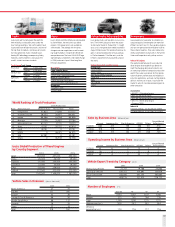Isuzu 2007 Annual Report Download - page 14
Download and view the complete annual report
Please find page 14 of the 2007 Isuzu annual report below. You can navigate through the pages in the report by either clicking on the pages listed below, or by using the keyword search tool below to find specific information within the annual report.
12
Question 2: Analysts are predicting stagnating
demand for trucks in Japan. How do you plan to deal
with this challenge?
In our domestic Japanese business, efforts to strengthen
the management culture at our sales companies are proving
to be an effective means of creating a strong culture capable
of withstanding a slight drop in new vehicle sales. We will
set and implement even higher targets this year.
Moreover, we established Isuzu Network Co., Ltd., to
strengthen our lifecycle business as a means of further en-
hancing our after sales service and lowering the total cost of
ownership so that customers can choose Isuzu vehicles with
utmost confidence and peace of mind. In addition to en-
hancing the level of service we are able to offer customers,
the new company will provide a powerful impetus for sales
companies to move beyond new vehicle sales in their efforts
to streamline operations.
Question 3: You are working to expand Isuzu’s
overseas business. Could you summarize the current
state of that business?
Until a few years ago, we were aggressively working to
enter new overseas markets. Starting fiscal 2007, I am
planning to focus carefully and deliberately on strengthen-
ing operations and expanding sales in overseas markets,
including existing markets.
The key to the truck business lies in seeing things from
the customer’s perspective, providing optimal products and
services that meet customer needs, and keeping customers’
trucks operating smoothly and reliably. In that sense, we
need to work to enhance our local production capability,
ensure that locally produced products have consistently
high quality, and implement an extensive after sales service
program by strengthening our sales organization and
infrastructure.
I plan to undertake a series of policies designed to expand
sales by carefully and deliberately pursuing these activities
so that we can vigorously grow deep Isuzu roots in every
market.
Question 4: How do you plan to develop
Isuzu’s truck products?
We have new light- and medium-duty trucks in the form
of the 700P series, which offers robust cargo capacity thanks
to its high-output, small-displacement engine and light-
weight design, excellent fuel economy, and low cost.
Question 1: What kind of initiatives are you pursuing to
achieve sustainable growth?
I believe it is important to grow revenue in a balanced manner
by developing our business globally. Although once Isuzu’s
revenues used to be dependent on the Japanese market, based
on this belief we have taken steps over the last several years to
streamline domestic Japanese operations and expand overseas
operations, reflecting the need to reduce the extent to which
our results are influenced by the extreme fluctuations of the
Japanese market.
Until now, the percentage of operating income generated
by overseas sales had been stalled at around 20%, even as the
foreign sales ratio exceeded 60%. Thanks to these efforts, we
have changed Isuzu’s revenue structure, increasing the per-
centage of overseas sales to 64% and the percentage of oper-
ating income to a similar level for this fiscal year. I believe we
can ultimately achieve sustainable growth by continuing to
develop our business along these lines.
Interview with the President n Isuzu Motors Limited Annual Report 2007
























